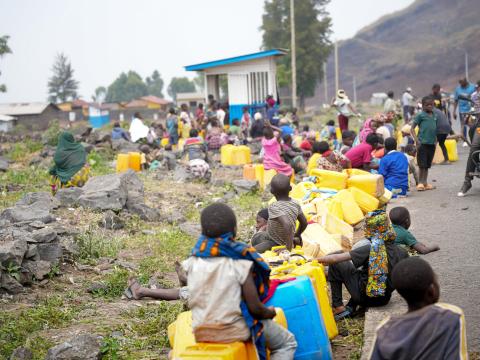DR Congo: Thousands at Risk of Cholera Amid Critical Water Shortage in Nyiragongo

By Rodrigue Harakandi, Communications Coordinator
The Nyiragongo territory, north of Goma in the Democratic Republic of Congo (DRC), is facing a dire humanitarian crisis. Once a transit zone for displaced people fleeing conflict in Rutshuru and Masisi, the region now suffers from severe water shortages, exposing thousands, including many internally displaced persons (IDPs) to major health risks, particularly cholera.
A Devastating Humanitarian Situation
Since the M23 takeover of Goma, many displaced people have chosen to settle with host families in Nyiragongo rather than return to their home villages. However, access to clean water is dwindling, with only a few functional water points operating once or twice a week.
Florence, an IDP and former participant of World Vision’s I-Life program in Bushagara, shares her ordeal:
"I came here to fetch water at 5 a.m., and it’s only now at 11 a.m. that I’ve finally been served. The line is too long because so many depend on this water point, some even come from Kilimanyoka, 8 km away."
Growing Health and Safety Risks
The lack of clean water isn’t just a health threat but also endangers children and infants. Florance, who waited for hours under the scorching sun with her baby, says:
"My baby hasn’t stopped crying. I’ve spent all these hours in the heat with him—he’s exhausted and so hungry."
The situation is even more critical as most of those in line are children, exposed to accidents near the main water point along National Highway 2.
Unreliable and Costly Water Access
Water is not only scarce but also comes at a price:
"You have to pay 100 Congolese francs ($0.035) for a 20L jerrycan. If you don’t have money, you can’t even come here," Florence explains.
Some walk for kilometers with no guarantee of securing water.
"Many may leave empty-handed; the lines are just too long," she adds.
Urgent Call to Action
Immediate intervention is critical to:
Restore emergency water access through temporary solutions (water trucks, boreholes)
Prevent disease outbreaks with hygiene kits and strengthened health monitoring
Protect the most vulnerable, especially women and children
As Florence warns: "No water today means disease tomorrow."
International actors and local authorities must act now to prevent the crisis from spiraling out of control.